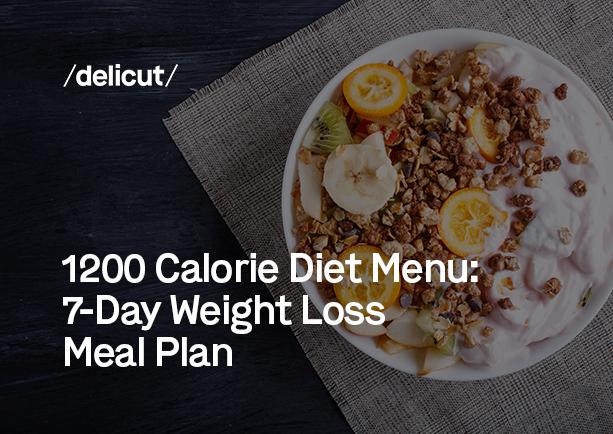1200 Calorie Diet Menu: 7-Day Weight Loss Meal Plan

The 1200-calorie diet has emerged as a popular choice for those seeking a structured approach to shedding pounds. This diet plan, which limits daily calorie intake to 1200, is seen as a way to create a calorie deficit essential for weight loss while still providing the necessary nutrients the body needs.
But why 1200 calories? It's often considered a baseline number for many individuals to achieve weight loss without compromising their health.
However, it's not a one-size-fits-all solution. The effectiveness and suitability of a 1200-calorie diet can vary based on individual metabolism, physical activity level, and overall health. In this blog, we'll dive into a 7-day meal plan designed for those considering a 1200-calorie diet.
Our focus is not just on calorie count but also on ensuring a balanced, nutritious, and varied menu to keep your body nourished and satisfied.
Benefits and Considerations
The 1200-calorie diet can be an effective way to initiate weight loss, particularly for women with a sedentary lifestyle or those seeking a structured approach to reduce calorie intake. By limiting calories, this diet can help create a caloric deficit essential for weight loss, while still providing enough energy for daily activities when well-planned.
However, it's crucial to consider nutritional balance. A diet too low in calories may lead to nutrient deficiencies, reduced muscle mass, and a slower metabolism. Women, especially those who are active, may require more calories to maintain their health and energy levels.
Therefore, it's important to tailor the diet to individual needs and to consult with a healthcare provider or a dietitian. Ensuring that the diet includes a variety of foods to meet macro and micronutrient needs is key for maintaining overall health while pursuing weight loss goals.
Day-by-Day Meal Plan Breakdown
Embarking on a 1200-calorie diet requires meticulous planning to ensure each meal is both nutritious and satisfying. Each day of this meal plan is designed to provide a balanced mix of macronutrients while staying within the 1200-calorie limit, ensuring you receive adequate nutrition for your body’s needs. Here’s a detailed breakdown of a 7-day meal plan:
Day 1: Fresh Start
- Breakfast (300 calories): Oatmeal made with skim milk, topped with fresh berries and a teaspoon of honey.
- Lunch (300 calories): Mixed greens salad with grilled chicken, cherry tomatoes, cucumber, and a light vinaigrette.
- Dinner (400 calories): Baked salmon with steamed broccoli and quinoa.
- Snacks (200 calories): An apple and a handful of almonds.
Day 2: Energy Boost
- Breakfast (300 calories): Greek yogurt with sliced banana and a sprinkle of granola.
- Lunch (300 calories): Turkey breast sandwich on whole-grain bread with lettuce, tomato, and mustard.
- Dinner (400 calories): Stir-fried tofu with mixed vegetables over brown rice.
- Snacks (200 calories): Carrot sticks with hummus and a small peach.
Day 3: Protein-Packed
- Breakfast (300 calories): Scrambled eggs with spinach, mushrooms, and a slice of whole-grain toast.
- Lunch (300 calories): Lentil soup with a side of whole-grain crackers.
- Dinner (400 calories): Grilled chicken breast with a sweet potato and green beans.
- Snacks (200 calories): A pear and a string cheese.
Day 4: Fiber Focus
- Breakfast (300 calories): Bran cereal with skim milk and fresh strawberries.
- Lunch (300 calories): Quinoa salad with black beans, corn, avocado, and lime dressing.
- Dinner (400 calories): Baked cod with roasted asparagus and a small baked potato.
- Snacks (200 calories): A small apple and a handful of walnuts.
Day 5: Heart-Healthy Fats
- Breakfast (300 calories): Avocado toast on whole-grain bread with a poached egg.
- Lunch (300 calories): Tuna salad with mixed greens and a whole-grain roll.
- Dinner (400 calories): Grilled shrimp with a medley of sautéed vegetables and farro.
- Snacks (200 calories): Cottage cheese with pineapple chunks.
Day 6: Comfort Food Made Healthy
- Breakfast (300 calories): Whole-grain waffles with a dollop of ricotta cheese and a drizzle of maple syrup.
- Lunch (300 calories): Grilled vegetable wrap with hummus in a whole-wheat tortilla.
- Dinner (400 calories): Turkey chili with a side of steamed cauliflower.
- Snacks (200 calories): A banana and a small handful of pumpkin seeds.
Day 7: Balanced and Satisfying
- Breakfast (300 calories): Smoothie with spinach, mixed berries, protein powder, and almond milk.
- Lunch (300 calories): Chicken Caesar salad with light dressing and a whole-grain roll.
- Dinner (400 calories): Vegetable stir-fry with tofu and a side of jasmine rice.
- Snacks (200 calories): An orange and a few dark chocolate squares.
Conclusion
This structured approach to eating, when followed correctly, can help create the calorie deficit necessary for weight loss while still supplying essential nutrients. However, it's important to remember that this diet is not a one-size-fits-all solution. Individual needs, lifestyle, and activity levels play a crucial role in determining the right dietary approach.
As you conclude this 1200 calorie diet, 7-day meal plan, consider the journey as a learning experience in mindful eating and portion control. Whether you continue with this calorie level or adjust it to suit your changing needs, the principles of balanced nutrition and variety remain key.
Always listen to your body and consult healthcare professionals for personalized advice, especially if you plan to follow the diet for an extended period.
FAQs
1. What does a typical day look like on a 1200-calorie diet for weight loss?
A typical day on a 1200-calorie diet includes three main meals and one or two small snacks. Each meal is carefully portioned to stay within the calorie limit while providing balanced nutrition. For instance, breakfast might be a small bowl of oatmeal with berries, lunch could be a salad with lean protein, and dinner might consist of a portion of grilled fish with vegetables. Snacks could include fruit or a small handful of nuts.
2. Are there specific food restrictions or guidelines I should follow while on a 1200-calorie weight-loss meal plan?
While there are no specific food restrictions, it's important to focus on nutrient-dense foods to meet your nutritional needs within the calorie limit. This means prioritizing vegetables, fruits, lean proteins, whole grains, and healthy fats. It's advisable to limit high-calorie, low-nutrient foods like sugary snacks, processed foods, and large portions of high-fat items.
3. Can you provide a sample 7-day meal plan with recipes for a 1200-calorie diet to kickstart weight loss?
A 7-day meal plan for a 1200-calorie diet would include varied meals to ensure nutritional balance. Each day's menu would consist of breakfast, lunch, dinner, and one or two snacks, with each meal carefully portioned to fit within the daily calorie goal. Please refer to the blog for a detailed breakdown of a 7-day meal plan.
4. What are some practical tips for maintaining energy levels and satiety while adhering to a 1200-calorie meal plan?
To maintain energy and satiety, focus on protein-rich foods and fiber. Include lean meats, fish, legumes, and eggs in your meals. Opt for fiber-rich fruits, vegetables, and whole grains, as fiber helps keep you full. Drink plenty of water, and space meals and snacks evenly throughout the day. Avoid sugary, high-calorie foods that can cause energy spikes and crashes.
5. Is a 1200-calorie diet suitable for everyone, or are there specific health considerations I should be aware of before starting this meal plan?
A 1200-calorie diet is not suitable for everyone. It's generally more appropriate for small, sedentary women and should not be used by teenagers, men, or active women, as their caloric needs are typically higher. Before starting a 1200-calorie diet, it's crucial to consult with a healthcare provider, especially for those with health conditions like diabetes or heart disease. This diet may not provide sufficient energy for highly active individuals or those with specific nutritional needs.
Read More:
Muscle Gain Diet Plan with 7 Day Meal Planning
Beat the Sugar Cravings Top 5 Meal Plans for Diabetic People
Lose the Extra Pounds 5 Great Diet Meals for Your Dinner
Related Blogs
The Burnout Diet
Jan 30, 2026 | 8The mental load of “What should I eat today?"
Jan 22, 2026 | 8The real glow-up starts with your gut health
Jan 14, 2026 | 8Healthy food that doesn’t taste like “Diet Food”
Jan 17, 2026 | 8Why do most people in the UAE get their calories wrong
Dec 8, 2025 | 6DASH Diet Meal Plan
Nov 11, 2025 | 8Fatty Liver Meal Plan
Oct 31, 2025 | 8Pregnancy Diet Meal Plan
Oct 27, 2025 | 82000 Calorie Meal Plan
Oct 1, 2025 | 8Intermittent Fasting Diet Plan
Sep 5, 2025 | 8






